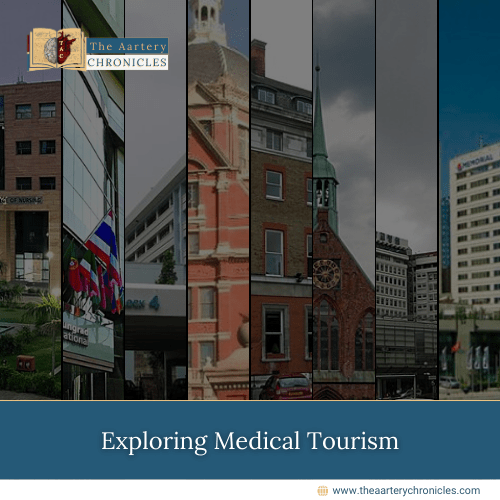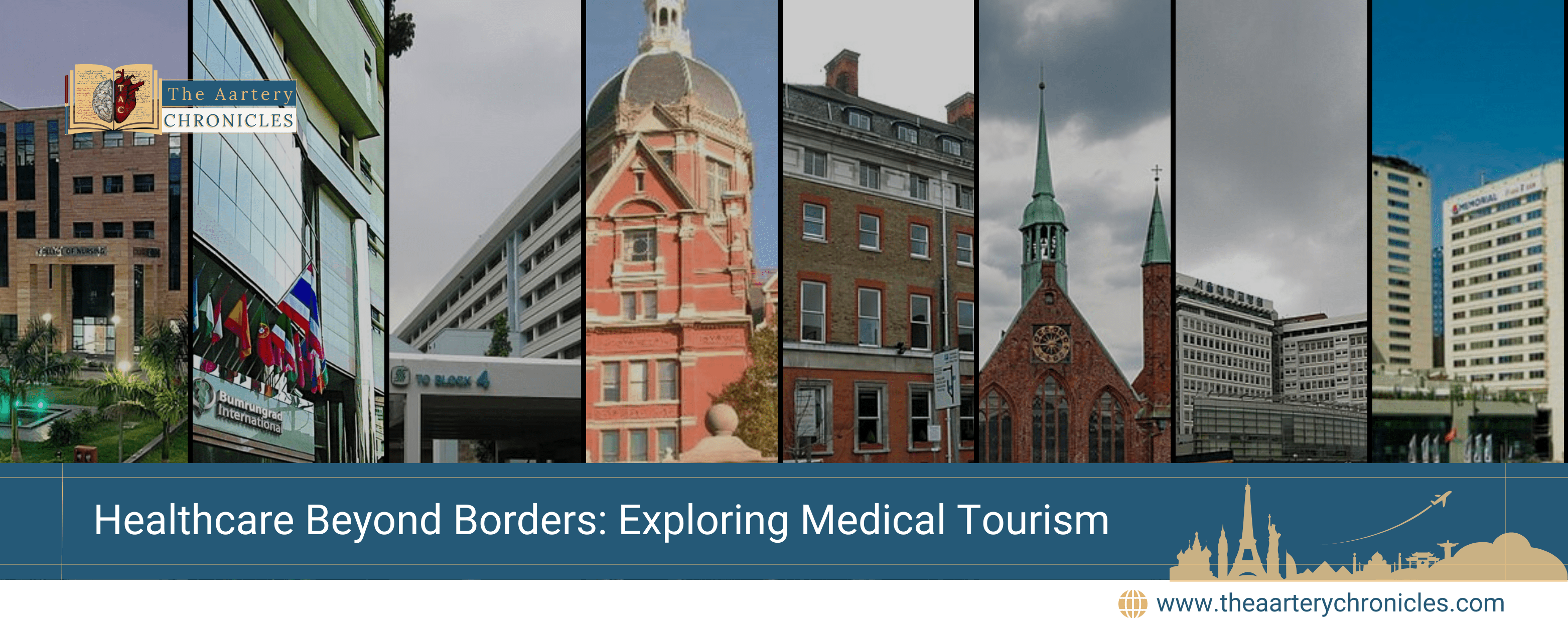

Healthcare Beyond Borders: Exploring Medical Tourism
“Borders are no longer barriers.” Medical tourism, seeking medical treatment or procedures abroad, has significantly increased in recent years. This chapter explores the clinical significance of travel and tourism, particularly in medical tourism, shedding light on its implications, benefits, and considerations for both patients and healthcare providers. We will delve into key examples and insights offering us a comprehensive overview.
Understanding Medical Tourism
Medical tourism, often referred to as health tourism or medical travel, is the act of travelling to another country or region to receive medical treatment, surgery, or healthcare services. Patients opt for medical tourism for various reasons, including access to advanced medical procedures, cost-effectiveness, reduced wait times, and the opportunity to combine medical treatment with leisure travel. The world is a big place and every corner has something unique to offer.
The Global Impact of Medical Tourism
The impact of medical tourism extends far beyond individual patient experiences. It has significant implications for global healthcare systems, economies, and medical professionals. Countries with thriving medical tourism industries see a boost in their healthcare infrastructure and revenue generation. Medical Tourism supports the concept of Globalisation and this helps in providing essential Healthcare facilities in almost all the places on Earth. Global Healthcare organizations play a crucial role in further enhancing the concept.
Examples of Medical Tourism

India: India is a prime destination for medical tourists, offering a wide range of medical treatments and procedures at a fraction of the cost in Western countries. Advanced healthcare facilities, highly skilled medical professionals, and renowned institutions like the AIIMS Hospital, Apollo Hospitals and Fortis Healthcare attract patients from around the world. (Medical Tourism in India)
- Affordable World-Class Healthcare: India offers advanced medical treatments, including cardiac surgeries, organ transplants, and cancer therapies, at a fraction of the cost compared to Western countries.
- Renowned Medical Institutions: Prestigious hospitals like AIIMS, Apollo Hospitals, and Fortis Healthcare provide state-of-the-art infrastructure and globally recognised expertise.
- Highly Skilled Professionals: India is home to top-notch surgeons and specialists trained at esteemed institutions, many with international experience.
- Integration of Modern and Traditional Medicine: Alongside cutting-edge medical procedures, India offers Ayurvedic treatments, Yoga, and meditation as part of a holistic healing experience.
- Streamlined Medical Tourism Services: Visa facilitation, multilingual staff, and dedicated international patient care centres ensure a seamless experience for global travellers.

India: India is a prime destination for medical tourists, offering a wide range of medical treatments and procedures at a fraction of the cost in Western countries. Advanced healthcare facilities, highly skilled medical professionals, and renowned institutions like the AIIMS Hospital, Apollo Hospitals and Fortis Healthcare attract patients from around the world. (Medical Tourism in India)
- Affordable World-Class Healthcare: India offers advanced medical treatments, including cardiac surgeries, organ transplants, and cancer therapies, at a fraction of the cost compared to Western countries.
- Renowned Medical Institutions: Prestigious hospitals like AIIMS, Apollo Hospitals, and Fortis Healthcare provide state-of-the-art infrastructure and globally recognised expertise.
- Highly Skilled Professionals: India is home to top-notch surgeons and specialists trained at esteemed institutions, many with international experience.
- Integration of Modern and Traditional Medicine: Alongside cutting-edge medical procedures, India offers Ayurvedic treatments, Yoga, and meditation as part of a holistic healing experience.
- Streamlined Medical Tourism Services: Visa facilitation, multilingual staff, and dedicated international patient care centres ensure a seamless experience for global travellers.

Thailand: Known for its world-class medical facilities and the famous Bumrungrad International Hospital, Thailand is a leading destination for medical tourists. The country offers everything from cosmetic surgeries to complex cardiac procedures, often at competitive prices. (Medical Tourism in Thailand)
- World-Class Facilities: Thailand boasts internationally accredited hospitals like Bumrungrad International, known for cutting-edge technology and high-quality care.
- Affordable Care: Medical treatments, including cosmetic surgeries, dental procedures, and major surgeries, are offered at significantly lower costs compared to Western countries.
- Highly Skilled Professionals: Thai medical staff are well-trained, many with international qualifications, ensuring excellent patient care and outcomes.
- Seamless Patient Experience: Hospitals cater to international patients with multilingual staff, medical concierge services, and assistance in travel arrangements.
- Blend of Healthcare and Tourism: Visitors can combine medical treatments with a relaxing holiday, enjoying Thailand’s rich culture, cuisine, and picturesque destinations.

Thailand: Known for its world-class medical facilities and the famous Bumrungrad International Hospital, Thailand is a leading destination for medical tourists. The country offers everything from cosmetic surgeries to complex cardiac procedures, often at competitive prices. (Medical Tourism in Thailand)
- World-Class Facilities: Thailand boasts internationally accredited hospitals like Bumrungrad International, known for cutting-edge technology and high-quality care.
- Affordable Care: Medical treatments, including cosmetic surgeries, dental procedures, and major surgeries, are offered at significantly lower costs compared to Western countries.
- Highly Skilled Professionals: Thai medical staff are well-trained, many with international qualifications, ensuring excellent patient care and outcomes.
- Seamless Patient Experience: Hospitals cater to international patients with multilingual staff, medical concierge services, and assistance in travel arrangements.
- Blend of Healthcare and Tourism: Visitors can combine medical treatments with a relaxing holiday, enjoying Thailand’s rich culture, cuisine, and picturesque destinations.

Singapore: Singapore is renowned for its high-quality healthcare services, exemplified by institutions like the Singapore General Hospital. Medical tourists flock to Singapore for treatments ranging from organ transplants to cancer care. (Medical Tourism in Singapore)
- World-Class Healthcare Standards: Singapore’s hospitals, like the Singapore General Hospital, are renowned for exceptional patient care, advanced technology, and clinical excellence.
- Specialised Treatments: The country is a leader in complex procedures, including organ transplants, cancer therapies, and cardiovascular surgeries, with outstanding success rates.
- Stringent Quality and Safety Protocols: Singapore’s healthcare system is consistently ranked among the best globally, ensuring top-notch medical care and patient safety.
- Highly Skilled Medical Professionals: Doctors and healthcare teams in Singapore are globally recognised, many trained in leading institutions worldwide.
- Convenient and Efficient Services: Medical tourists benefit from streamlined processes, multilingual support, and easy accessibility due to Singapore’s strategic location and excellent infrastructure.

Singapore: Singapore is renowned for its high-quality healthcare services, exemplified by institutions like the Singapore General Hospital. Medical tourists flock to Singapore for treatments ranging from organ transplants to cancer care. (Medical Tourism in Singapore)
- World-Class Healthcare Standards: Singapore’s hospitals, like the Singapore General Hospital, are renowned for exceptional patient care, advanced technology, and clinical excellence.
- Specialised Treatments: The country is a leader in complex procedures, including organ transplants, cancer therapies, and cardiovascular surgeries, with outstanding success rates.
- Stringent Quality and Safety Protocols: Singapore’s healthcare system is consistently ranked among the best globally, ensuring top-notch medical care and patient safety.
- Highly Skilled Medical Professionals: Doctors and healthcare teams in Singapore are globally recognised, many trained in leading institutions worldwide.
- Convenient and Efficient Services: Medical tourists benefit from streamlined processes, multilingual support, and easy accessibility due to Singapore’s strategic location and excellent infrastructure.

United States (USA): Renowned for cutting-edge medical technology and world-class healthcare facilities, the USA attracts patients seeking specialised treatments and surgeries. It’s a global leader in medical research and innovation, offering advanced procedures and therapies.
- Cutting-Edge Medical Technology: The USA leads in pioneering treatments and state-of-the-art medical devices, offering innovative solutions for complex health conditions.
- Renowned Healthcare Institutions: Prestigious hospitals like the Mayo Clinic, Johns Hopkins Hospital, and Cleveland Clinic attract patients globally for specialised care.
- Expertise in Specialised Treatments: The USA is a global leader in areas like oncology, neurology, organ transplants, and precision medicine, with exceptional success rates.
- World-Class Research and Clinical Trials: Access to groundbreaking treatments through advanced medical research and clinical trials is a significant draw for international patients.
- Comprehensive Healthcare Ecosystem: Patients benefit from integrated care, multidisciplinary teams, and robust support systems tailored to their needs.

United States (USA): Renowned for cutting-edge medical technology and world-class healthcare facilities, the USA attracts patients seeking specialised treatments and surgeries. It’s a global leader in medical research and innovation, offering advanced procedures and therapies.
- Cutting-Edge Medical Technology: The USA leads in pioneering treatments and state-of-the-art medical devices, offering innovative solutions for complex health conditions.
- Renowned Healthcare Institutions: Prestigious hospitals like the Mayo Clinic, Johns Hopkins Hospital, and Cleveland Clinic attract patients globally for specialised care.
- Expertise in Specialised Treatments: The USA is a global leader in areas like oncology, neurology, organ transplants, and precision medicine, with exceptional success rates.
- World-Class Research and Clinical Trials: Access to groundbreaking treatments through advanced medical research and clinical trials is a significant draw for international patients.
- Comprehensive Healthcare Ecosystem: Patients benefit from integrated care, multidisciplinary teams, and robust support systems tailored to their needs.

United Kingdom (UK): The UK’s National Health Service (NHS) provides high-quality healthcare services to its residents. Its emphasis on patient care, medical research, and medical education makes it a hub for medical excellence.
- Renowned Medical Institutions: The UK is home to globally recognised hospitals like Great Ormond Street Hospital and King’s College Hospital, known for excellence in specialised care.
- Cutting-Edge Medical Research: The UK’s strong focus on medical research and innovation ensures access to advanced treatments and therapies, often developed in collaboration with top universities.
- Highly Skilled Medical Professionals: The UK boasts some of the world’s best-trained healthcare providers, with many specialists internationally acclaimed for their expertise.
- Focus on Patient-Centric Care: The National Health Service (NHS) is celebrated for its commitment to patient welfare and holistic healthcare services.
- Specialisation in Complex Procedures: The UK excels in areas like oncology, neurosurgery, and fertility treatments, attracting patients from around the globe seeking high-standard medical care.

United Kingdom (UK): The UK’s National Health Service (NHS) provides high-quality healthcare services to its residents. Its emphasis on patient care, medical research, and medical education makes it a hub for medical excellence.
- Renowned Medical Institutions: The UK is home to globally recognised hospitals like Great Ormond Street Hospital and King’s College Hospital, known for excellence in specialised care.
- Cutting-Edge Medical Research: The UK’s strong focus on medical research and innovation ensures access to advanced treatments and therapies, often developed in collaboration with top universities.
- Highly Skilled Medical Professionals: The UK boasts some of the world’s best-trained healthcare providers, with many specialists internationally acclaimed for their expertise.
- Focus on Patient-Centric Care: The National Health Service (NHS) is celebrated for its commitment to patient welfare and holistic healthcare services.
- Specialisation in Complex Procedures: The UK excels in areas like oncology, neurosurgery, and fertility treatments, attracting patients from around the globe seeking high-standard medical care.

Germany: Known for its medical tourism, Germany combines state-of-the-art medical technology with a high level of expertise. The country’s focus on research and development has resulted in some groundbreaking medical advancements.
- World-Class Medical Technology: Germany is at the forefront of medical innovation, offering state-of-the-art diagnostic tools and advanced treatment techniques.
- Highly Skilled Specialists: German doctors and surgeons are globally recognised for their expertise, with many trained at premier institutions and holding international certifications.
- Comprehensive Medical Services: From orthopaedic and cardiac surgeries to cancer care and rehabilitation, Germany provides a wide range of specialised medical treatments.
- Strong Emphasis on Research and Development: Germany’s focus on medical research has led to pioneering advancements, ensuring access to cutting-edge therapies and procedures.
- Stringent Quality and Safety Standards: German healthcare is known for its rigorous adherence to quality control, ensuring patient safety and excellent treatment outcomes.

Germany: Known for its medical tourism, Germany combines state-of-the-art medical technology with a high level of expertise. The country’s focus on research and development has resulted in some groundbreaking medical advancements.
- World-Class Medical Technology: Germany is at the forefront of medical innovation, offering state-of-the-art diagnostic tools and advanced treatment techniques.
- Highly Skilled Specialists: German doctors and surgeons are globally recognised for their expertise, with many trained at premier institutions and holding international certifications.
- Comprehensive Medical Services: From orthopaedic and cardiac surgeries to cancer care and rehabilitation, Germany provides a wide range of specialised medical treatments.
- Strong Emphasis on Research and Development: Germany’s focus on medical research has led to pioneering advancements, ensuring access to cutting-edge therapies and procedures.
- Stringent Quality and Safety Standards: German healthcare is known for its rigorous adherence to quality control, ensuring patient safety and excellent treatment outcomes.

South Korea: Renowned for its advanced cosmetic and plastic surgery procedures, South Korea’s medical facilities are sought after by patients looking for aesthetic enhancements. The country is also making strides in other medical fields.
- Pioneers in Cosmetic and Plastic Surgery: South Korea is a global leader in aesthetic enhancements, offering advanced procedures with natural-looking results and high precision.
- Cutting-Edge Medical Technology: From robotic surgeries to advanced diagnostics, South Korea’s healthcare system utilises the latest innovations for superior patient care.
- Highly Skilled Specialists: South Korean surgeons and medical professionals are internationally trained and renowned for their expertise, particularly in cosmetic and reconstructive surgery.
- Broad Range of Treatments: Beyond aesthetics, South Korea excels in fields like oncology, organ transplants, and orthopaedics, providing comprehensive healthcare services.
- Seamless Medical Tourism Infrastructure: Multilingual support, streamlined visa processes, and world-class facilities ensure a convenient experience for international patients.

South Korea: Renowned for its advanced cosmetic and plastic surgery procedures, South Korea’s medical facilities are sought after by patients looking for aesthetic enhancements. The country is also making strides in other medical fields.
- Pioneers in Cosmetic and Plastic Surgery: South Korea is a global leader in aesthetic enhancements, offering advanced procedures with natural-looking results and high precision.
- Cutting-Edge Medical Technology: From robotic surgeries to advanced diagnostics, South Korea’s healthcare system utilises the latest innovations for superior patient care.
- Highly Skilled Specialists: South Korean surgeons and medical professionals are internationally trained and renowned for their expertise, particularly in cosmetic and reconstructive surgery.
- Broad Range of Treatments: Beyond aesthetics, South Korea excels in fields like oncology, organ transplants, and orthopaedics, providing comprehensive healthcare services.
- Seamless Medical Tourism Infrastructure: Multilingual support, streamlined visa processes, and world-class facilities ensure a convenient experience for international patients.

Turkey: Turkey offers a range of medical services, including dental treatments, hair transplants, and cosmetic surgeries. It has modern healthcare facilities and well-trained medical professionals.
- Expertise in Cosmetic and Aesthetic Procedures: Turkey is globally renowned for hair transplants, dental treatments, and cosmetic surgeries, combining high-quality care with affordability.
- State-of-the-Art Medical Facilities: The country boasts modern hospitals equipped with advanced technology and accredited by international organisations.
- Highly Skilled Medical Professionals: Turkish doctors and surgeons are well-trained, often holding international certifications, ensuring excellent patient outcomes.
- Cost-Effective Treatments: Turkey offers competitive pricing for a variety of procedures, making it a preferred destination for medical tourists.
- Accessible and Convenient Services: The country’s strategic location, multilingual staff, and tailored medical tourism packages provide a seamless experience for international patients.

Turkey: Turkey offers a range of medical services, including dental treatments, hair transplants, and cosmetic surgeries. It has modern healthcare facilities and well-trained medical professionals.
- Expertise in Cosmetic and Aesthetic Procedures: Turkey is globally renowned for hair transplants, dental treatments, and cosmetic surgeries, combining high-quality care with affordability.
- State-of-the-Art Medical Facilities: The country boasts modern hospitals equipped with advanced technology and accredited by international organisations.
- Highly Skilled Medical Professionals: Turkish doctors and surgeons are well-trained, often holding international certifications, ensuring excellent patient outcomes.
- Cost-Effective Treatments: Turkey offers competitive pricing for a variety of procedures, making it a preferred destination for medical tourists.
- Accessible and Convenient Services: The country’s strategic location, multilingual staff, and tailored medical tourism packages provide a seamless experience for international patients.
Benefits and Considerations for Healthcare Providers
Healthcare providers, including hospitals and medical professionals, play a pivotal role in the medical tourism industry. They must navigate regulatory, ethical, and logistical challenges while ensuring quality care for international patients.
Ethical and Legal Aspects
Medical tourism raises ethical and legal questions regarding patient safety, informed consent, and the standard of care provided. Healthcare providers and Institutions must adhere to international standards and regulations, maintaining transparency and accountability throughout the patient’s journey.
Patient-Centric Care and Cultural Sensitivity
Cultural competency and sensitivity are vital when treating international patients. The language barriers, cultural differences, and unique healthcare expectations must be addressed efficiently. Tailoring care to individual patient needs is paramount.
Challenges and Opportunities
Healthcare providers must adapt to the evolving landscape of medical tourism, capitalizing on opportunities while mitigating challenges. Economic benefits, international recognition, and expanding patient networks are significant advantages, but competition and quality assurance remain ongoing challenges. Timely research and advancements are crucial when catering to the needs of the patients.
Enhancing Patient Experience
The patient experience is central to the success of medical tourism. Healthcare providers should focus on personalized care, streamlined processes, and post-treatment support to ensure patients receive comprehensive and satisfactory care
Conclusion:
Medical tourism is a dynamic and evolving field that offers numerous clinical opportunities and challenges for healthcare providers worldwide. It has the potential to benefit patients, healthcare systems, and economies when managed ethically and professionally. As the medical tourism industry continues to grow, healthcare professionals and institutions should stay informed, adapt to changing trends, and prioritize patient-centric care to navigate this unique healthcare landscape successfully.

Author:
Dr Darshit Patel, MD General Medicine








